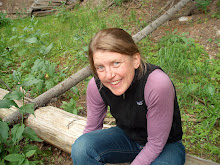 |
| Big Cottonwood Canyon Water Shed |
We first moved onto our property in the summer of 2007. We had optimistic dreams of living on our land as we built, in the tradition of so many owner-builders before us. We built platforms and erected two large canvas tents sheltered by an aspen grove and made an idyllic summer home for a Papa, a Mama, and a 3.5 year old Boy.
One of the most memorable parts of that summer adventure was fetching water. We had two 5-gallon water containers and two 2.5 gallon drinking water containers. We had a platform for the large containers that held it at a height making washing and tooth-brushing convenient. We hauled water from a neighbor's outside spigot and used it for drinking, cooking, dish-washing, and washing up. We had a port-a-potty on the site and usually took our laundry to a laundry mat, but otherwise we carried the water we used.
Five gallons of water is not light, and we became very familiar with how much water we used. Our family of 3 used about 3 gallons per day.
Later, we were forced (by interfering neighbors) to move from our summer idyll to a fully equipped condominium. It was alarming how quickly we became casual about leaving the water running too long while we brushed our teeth, or lingered in the warm shower. In future iterations of our transient builder life-style, we lived in a place where the water pipes froze, forcing us again to haul water, and eventually to move to a converted store with a spring flooding problem. Then we lived in our partially built house again, with water this time, but coming through one pipe in the basement wall with a bucket for drain we carried over to the floor drain a few feet away.
Now there is fully functioning plumbing in our house, serving up the winner of the best-tasting rural Utah water for 2011 and I am so grateful for that water. We live in an important watershed and we are careful in our stewardship of that resource.
The point of this story is that water is something I've thought about a lot over the last few years.
Today is World Water Day. There are people all over the world who work much harder than I ever have to provide enough water and food for their families. In fact, nearly 800 million people lack access to clean drinking water. Here are some suggested actions from the U.N. for those wanting to help protect the world's water supply:
There are 7 billion people to feed on the planet today and another 2 billion are expected to join by 2050. Statistics say that each of us drinks from 2 to 4 litres of water every day, however most of the water we ‘drink’ is embedded in the food we eat: producing 1 kilo of beef for example consumes 15,000 litres of water while 1 kilo of wheat ’drinks up’ 1,500 litres. When a billion people in the world already live in chronic hunger and water resources are under pressure we cannot pretend the problem is ‘elsewhere’. Coping with population growth and ensuring access to nutritious food to everyone call for a series of actions we can all help with: |
What is not mentioned in these actions is the tremendous amount of water needed to produce and refine fuel used to transport food, goods, etc. I recommend supporting your local economy as another action to help protect the world's water resource.
- follow a healthier, sustainable diet;
- consume less water-intensive products;
- reduce the scandalous food wastage: 30% of the food produced worldwide is never eaten and the water used to produce it is definitively lost!
- produce more food, of better quality, with
- less water.
Healthy watersheds are critical to the health of our planet and all its inhabitants. The phrase has become a bit of a cliché, but is a truism nonetheless: We all live downstream.






No comments:
Post a Comment